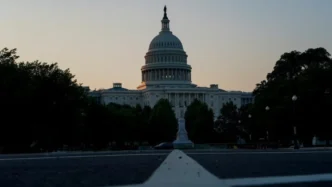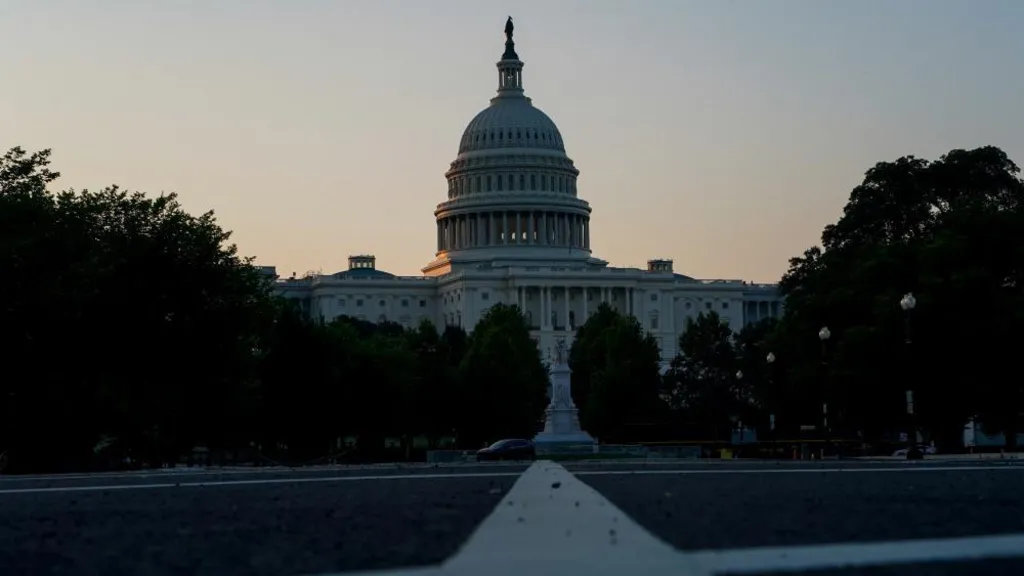️ Senate Opens Debate on Trump’s $5 Trillion ‘Big Beautiful Bill’
The U.S. Senate has officially begun voting on President Donald Trump’s sweeping budget legislation, known as the “big beautiful bill,” which could reshape welfare, taxation, and federal borrowing.
The vote follows weeks of contentious negotiations between Republicans and Democrats, with sharp internal divisions even among GOP lawmakers over how deeply to cut welfare in order to fund $3.8 trillion in Trump-era tax breaks.
Trump has set a July 4 deadline for the bill to pass, branding it a cornerstone of his economic legacy.
What’s in Trump’s ‘Big Beautiful Bill’?
The Senate version of the nearly 1,000-page bill includes:
-
Tax cuts on Social Security benefits
-
Elimination of federal taxes on overtime and tipped income
-
$5 trillion in new borrowing, projected to add $3.3 trillion to the national debt
-
Massive cuts to Medicaid, risking health insurance for millions
-
Extension of key Trump-era tax breaks
While the bill fulfills Trump’s promises on tax reform, it clashes with conservative concerns about escalating national debt and breaks from traditional fiscal restraint.
⚖️ Fierce Senate Debate: Welfare Cuts vs Tax Relief
The bill passed the House of Representatives by just one vote last month, and now faces a similar nail-biter in the Senate. On Sunday, the Senate narrowly agreed (51-49) to open debate, with two Republicans—Thom Tillis and Rand Paul—joining all Democrats in opposition.
-
Sen. Thom Tillis (R-NC), who announced his retirement after the vote, condemned the bill for breaking promises to voters and prioritizing “raw politics.”
-
Sen. Rand Paul (R-KY) objected to the bill’s ballooning debt and Medicaid cuts.
-
Sen. Adam Schiff (D-CA) called the proposal “terrible,” warning that millions could lose health coverage.
Republicans, meanwhile, defended the bill’s structure. Sen. Dan Sullivan (R-AK) said the Medicaid program would remain intact, despite public concern.
️ Next Steps: Senate Vote, House Re-vote, and Tight Margins
A final Senate vote is expected late Monday night or early Tuesday morning. Republicans can afford no more than three defections; otherwise, Vice President JD Vance would need to cast a tie-breaking vote.
If passed, the bill returns to the House for approval. House leadership anticipates a vote as soon as Wednesday, though internal GOP frustrations over Senate amendments could make the outcome unpredictable.
Economic Risks and the National Debt
The Congressional Budget Office projects the Senate version will increase the U.S. debt by $3.3 trillion, adding to the current $36 trillion debt load.
Treasury Secretary Scott Bessent warned Congress must address the debt ceiling by mid-July, or risk a potential default by August.
Earlier this summer, even Elon Musk publicly opposed the debt expansion, criticizing the plan as fiscally irresponsible.
High Stakes Ahead of Independence Day
The “big beautiful bill” could define the Trump administration’s second-term legislative legacy—but not without fracturing Republican unity and intensifying partisan divides. With the 4 July deadline fast approaching, all eyes remain on Capitol Hill as Congress races against time.






